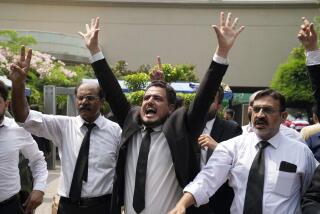2nd suspected Mumbai plotter in custody
NEW DELHI — Pakistan said Wednesday that it had detained a second suspected plotter of last month’s Mumbai terrorism rampage, stepping up its bid to mollify India and the United States over the alleged involvement of Pakistani militants.
Pakistani Prime Minister Yusaf Raza Gillani told reporters that security forces had taken Zarar Shah, a member of the outlawed Lashkar-e-Taiba militant group, into custody. Shah is reportedly the communications chief for Lashkar-e-Taiba, or Army of the Pure, and is suspected of having worked out communication methods for the 10 gunmen who stormed luxury hotels and other busy venues in Mumbai in a 2 1/2-day siege in which more than 170 people were killed.
Since the attacks, New Delhi and Washington have leaned heavily on the government in Islamabad to crack down on the Islamist group, whose roots are in the Pakistani-controlled portion of Kashmir.
Pakistani officials this week confirmed the arrest of Zaki ur Rehman Lakhvi, also a Lashkar-e-Taiba commander and suspected mastermind of the Mumbai attacks.
But Gillani backtracked Wednesday on reports that Maulana Masood Azhar, the leader of another banned Kashmiri extremist group, was under house arrest, contradicting a statement made by the Pakistani defense minister the previous day. Azhar helped found Jaish-e-Muhammad, which was implicated in a 2001 attack on India’s Parliament that brought the two nuclear-armed powers to the brink of war.
Gillani would not confirm that Azhar had been placed under house arrest.
It was the latest in a flurry of contradictory statements out of Islamabad this week that appear to reflect the government’s ambivalence, or possibly indecision, over how best to respond to accusations that the Mumbai attacks were launched from Pakistani soil.
India and the U.S. say the evidence is strong and demands aggressive action. But Islamabad is worried about a public backlash if it is seen as kowtowing to New Delhi and Washington.
Pakistani officials have therefore tried to portray the arrests of Lashkar-e-Taiba militants as being for domestic reasons, because they were members of an outlawed organization.
“We are not doing anything under Indian pressure. The ban on Lashkar-e-Taiba already exists,” Gillani told reporters in the city of Multan.
He and other officials say the militants will not be extradited to India -- a move that would cause a popular outcry in Pakistan.
In Washington, Adm. Michael G. Mullen, chairman of the Joint Chiefs of Staff, said he was encouraged by the arrests and moves by Pakistan’s military to close training camps used by Lashkar-e-Taiba.
“These are first steps. And so there are more steps to follow,” Mullen said. “It remains very important that the government of Pakistan take not just the steps they’ve taken, but the steps that they need to continue to take, to root this out so it doesn’t happen again.”
India has yet to comment on the arrests, but some Indian analysts are already cautioning the government in New Delhi to beware of Pakistani “doublespeak.” Pakistan has been known to arrest militants under international pressure only to release them quietly a few months later.
On Wednesday, a Security Council panel agreed to an Indian request that Jamaat-ud-Dawa be added to the U.N.’s list of terrorist groups.
Jamaat-ud-Dawa, a self-described charitable and educational organization, was created by the founders of Lashkar-e-Taiba after that group was outlawed.
The group is now subject to sanctions that include an asset freeze.
E. Ahamed, India’s minister of state for external affairs, told the council this week: “Jamaat-ud-Dawa and other such organizations need to be proscribed internationally, and effective sanctions imposed.”
Police officials in India said Wednesday that they planned to question an Indian national who allegedly ran Lashkar-e-Taiba safe houses in Nepal, from which he helped shepherd militants across the border into India, the Associated Press reported.
The man, identified as Sabauddin Ahmed, was arrested in February during an attack on a police station along with another suspected Indian Lashkar-e-Taiba recruit, Faheem Ansari, who was found carrying hand-drawn maps of some of the sites targeted in the Mumbai siege.
Authorities are concerned that the Mumbai gunmen, who India says were Pakistanis, might have had Indian support, but police have not said whether they believe either Ahmed or Ansari to be directly tied to the attacks.
--
Times staff writer Geraldine Baum at the United Nations and Julian E. Barnes in our Washington bureau contributed to this report.
More to Read
Sign up for Essential California
The most important California stories and recommendations in your inbox every morning.
You may occasionally receive promotional content from the Los Angeles Times.











